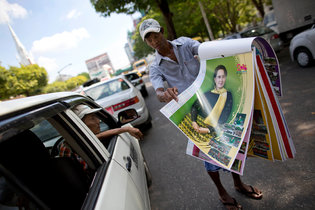A Milestone for Myanmar’s Democracy
ASIA--PACIFIC, 16 Nov 2015
The Editorial Board – International New York Times
12 Nov 2015 – Democracy may finally be taking hold in Myanmar. The evidence lies in a crushing electoral victory by Daw Aung San Suu Kyi and her party last Sunday in the country’s first free election in a quarter century — a verdict so decisive that the military, which refused to accept similar results in 1990 and placed Ms. Aung San Suu Kyi under house arrest for 15 years, has indicated that this time it will not interfere. Though the vote count is not complete, preliminary data suggests that her National League for Democracy won the most seats in the upper house of Parliament and leads in the regional assemblies.
But the elections are just a beginning. Myanmar is still at the start of what will be a difficult transition from an isolated military dictatorship to a more open society. Whether that can be accomplished peacefully will be a challenge for both the generals who have run the country for decades as well as Ms. Aung San Suu Kyi.
One hurdle is that while her party is likely to dominate Parliament and the executive branch, three large and powerful ministries — interior, defense and border security — will remain under the military. The generals, who came to power in 1962 after overthrowing a civilian government, made sure when they wrote a new Constitution in 2008 to maintain a grip on these three levers.

A street vendor in Yangon, Myanmar, displays a 2016 calendar featuring Daw Aung San Suu Kyi. Credit Gemunu Amarasinghe/Associated Press
The 2008 Constitution also bars Ms. Aung San Suu Kyi, a Nobel laureate, from becoming president, because her children are foreign nationals. Nobody doubts that this twisted provision was aimed at excluding her from the nation’s top job. Even so, dismissing the Constitution as “very silly,” she has asserted defiantly that she will be “making all the decisions” behind the scenes.
That is very bold language. It is also troubling and not particularly shrewd. The implication is that the next president will be a compliant member of her party and the Constitution can be ignored. But the success of Myanmar’s democratic evolution will depend on Ms. Aung San Suu Kyi working with the military, which under the Constitution is guaranteed 25 percent of the seats in Parliament. Bringing about changes in the Constitution that would put the security ministries under civilian control, and allow her to run for president, will require the support of 75 percent of Parliament. Simple arithmetic says that her ambitions depend on getting along with the generals.
Sunday’s election created a new reality in Myanmar; to maximize it, Ms. Aung San Suu Kyi needs all the help she can get.
___________________________________
The Nobel Peace Prize 1991 was awarded to Aung San Suu Kyi “for her non-violent struggle for democracy and human rights.”
A version of this editorial appears in print on November 13, 2015, in The International New York Times.
DISCLAIMER: The statements, views and opinions expressed in pieces republished here are solely those of the authors and do not necessarily represent those of TMS. In accordance with title 17 U.S.C. section 107, this material is distributed without profit to those who have expressed a prior interest in receiving the included information for research and educational purposes. TMS has no affiliation whatsoever with the originator of this article nor is TMS endorsed or sponsored by the originator. “GO TO ORIGINAL” links are provided as a convenience to our readers and allow for verification of authenticity. However, as originating pages are often updated by their originating host sites, the versions posted may not match the versions our readers view when clicking the “GO TO ORIGINAL” links. This site contains copyrighted material the use of which has not always been specifically authorized by the copyright owner. We are making such material available in our efforts to advance understanding of environmental, political, human rights, economic, democracy, scientific, and social justice issues, etc. We believe this constitutes a ‘fair use’ of any such copyrighted material as provided for in section 107 of the US Copyright Law. In accordance with Title 17 U.S.C. Section 107, the material on this site is distributed without profit to those who have expressed a prior interest in receiving the included information for research and educational purposes. For more information go to: http://www.law.cornell.edu/uscode/17/107.shtml. If you wish to use copyrighted material from this site for purposes of your own that go beyond ‘fair use’, you must obtain permission from the copyright owner.